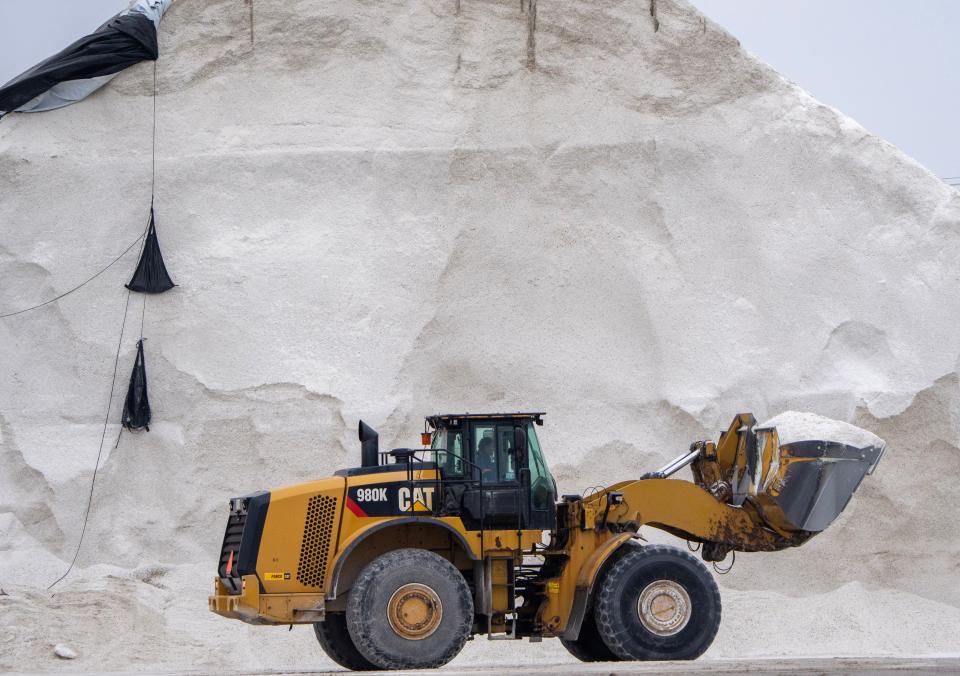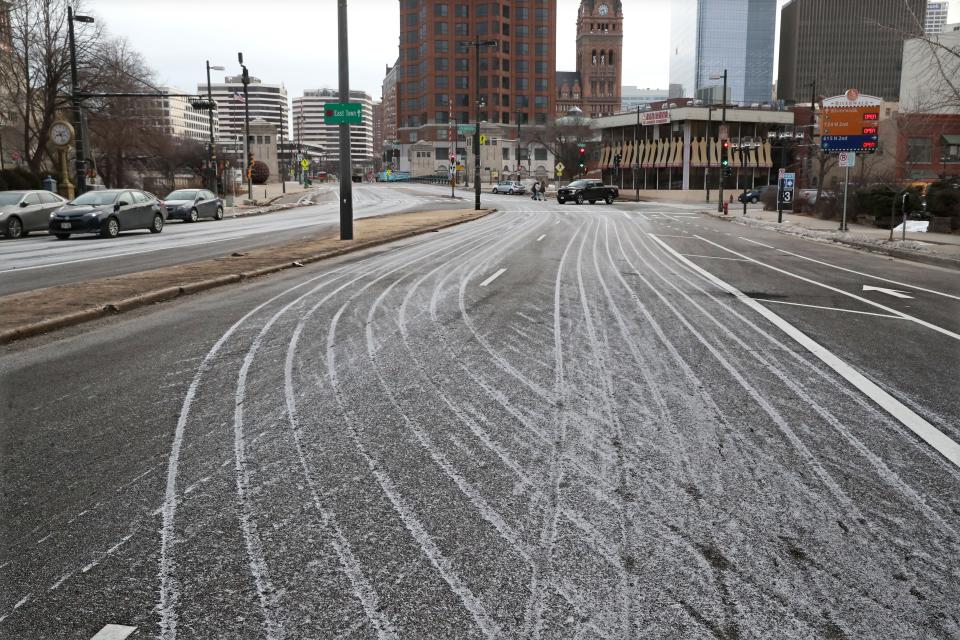Gov. Evers vetoes bill to curb road salt use, citing broad immunity to salters from slip-and-fall suits
- Oops!Something went wrong.Please try again later.
Advocates who hope to stop Wisconsin’s freshwater resources from being polluted by road salt are back to the drawing board after Gov. Tony Evers vetoed a bill Friday creating a state-run program on safe salt use that would have shielded certificate-holders from lawsuits.
The bill would have required the state Department of Agriculture, Trade and Consumer Protection to create a program to train commercial salt applicators in snow and ice removal methods that would safeguard water quality. Once applicators completed the program, they — and the property owners they work for — would have been shielded from slip-and-fall lawsuits if they used the methods they were trained on.
Salt is a cheap and easy way to melt ice, but data show Wisconsin's waters are growing saltier, putting ecosystems and infrastructure at risk. Only one coffee mug's worth of salt is needed for 10 sidewalk squares, but many lay down more because it feels safer. It has consequences — just one teaspoon of salt can permanently pollute five gallons of water.
More: Road salt is washing into Wisconsin's major waterways, with alarming results
Although many states have road salt training programs, Wisconsin would have been the second state in the nation to implement the limited liability aspect, preceded only by New Hampshire, which passed a similar law in 2013. Some road salt applicators say they lay down more salt than is necessary because they fear they or the property owner will get sued.
The bill was introduced in February 2023 by Sen. André Jacque, R-De Pere, Senate Minority Leader Dianne Hesselbein, D-Middleton, and Sen. Mark Spreitzer, D-Beloit. Hesselbein and Spreitzer withdrew their authorship after an amendment earlier this year strengthened the bill’s liability shields. Other Democrats followed suit.
In his veto message, Evers said he objected to such broad immunity from liability, particularly because, he said, the bill could allow an applicator to falsely claim that immunity without being certified. He also said the bill didn't assign any funding for the department to implement such a training program.

Allison Madison, program manager for Wisconsin Salt Wise, a coalition of groups working to reduce salt pollution in state waters, said she was frustrated by the veto. Without addressing fear of liability, she said, it will be tough to correct the problem of over-salting of private properties — where as much as half of total salting occurs.
She pointed to actions in other states, like Minnesota, which has a state-run Smart Salting program, and Ohio, where Gov. Mike DeWine recently directed $1 million to support municipal equipment upgrades that will reduce overapplication of road salt.
"I'd like to see (Evers) step up and take some initiative," she said. "He has invested in freshwater in other ways, but to ignore this issue, to me, is really disappointing."
Liability shields proved to be a sticking point
Plows from private snow removal companies circled the Capitol March 19 in support of the bill. Martin Tirado, CEO of the Snow & Ice Management Association, said the legislation would have allowed contracted road salt applicators to do the right thing.
"Right now they're erring on the side of extreme caution because of slip-and-fall lawsuits, so what you see is a really excessive amount of rock salt applied to paved surfaces," Tirado said. "It's not really necessary, and I think the contractors know that. What they're trying to do is satisfy the customer."
Erik Dyba, Madison branch manager for David J. Frank Landscaping, told the Journal Sentinel the pressure of a potential lawsuit often hangs over his and his coworkers' heads as they're laying down salt for their clients.
More: Road salt is polluting our freshwater. This artist used it in her work to make a point.
"If it was up to us, we'd put less down," Dyba said.
In testimony on the bill, Shannon Haydin, stormwater section manager for the Wisconsin Department of Natural Resources, said the department had conducted a survey of business owners and salt applicators in 2022 and more than 70% of respondents said slip-and-fall liability was a major concern.
But those who pulled their support took issue with the expansiveness of the liability shields the bill would have provided.
Hesselbein's office said the senator supported the bill as originally written, but that later changes made the legislation "less about salt reduction and the environment and instead (enacted) more unnecessary liability shields."
In a Friday statement, Jacque said the veto shows Evers cares less about clean water and more about keeping the state's trial lawyers happy. The Wisconsin Association for Justice was the only group registered against the bill.
Madison said though the bill was ultimately unsuccessful, she was glad that the issue of salt pollution was able to be raised with legislators and discussed at the Capitol. She said her organization may focus more on working with municipalities to develop local salt ordinances, even though that would not have as sweeping an effect.
How serious is Wisconsin's road salt problem?
Road salt is a part of life in Wisconsin and other cold-weather states, but concern is growing about its consequences. If too much is spread on pavement, the excess can be washed into streams, rivers and lakes, where chloride — one of the components of salt — can wreak havoc on aquatic life, disrupt the ecosystem of a body of water, make its way into groundwater and corrode pipes.
In a 2022 internal report to a committee of the Wisconsin’s Department of Natural Resources that works on water quality issues, staffers wrote that the state is on an “unsustainable” path of road salt usage.

Data collected over the last few years show Wisconsin’s waters have been getting saltier for decades. Chloride levels are rising at 41 of the 43 river sites where the DNR conducts long-term monitoring across the state – most seeing increases between 1% and 4% annually and some more than 10% annually. That kind of change adds up quickly.
Dozens of Wisconsin rivers are considered chronically impaired by chloride, most in the southeast region of the state.
It’s also making Wisconsin’s major bodies of freshwater saltier. A report this year from the Upper Mississippi River Basin Association named chloride as a top threat to the river’s water quality, citing an average increase of 35% in chloride concentrations between 1989 and 2018. And it’s estimated that 2.2 billion pounds of chloride flush into Lake Michigan annually.
More: How clean is the upper Mississippi River? 6 takeaways from a new report
Unlike other pollutants, chloride doesn’t break down over time. In other words, once it’s in, there’s no getting it out – so it must be stopped at the source.
Toxic amounts of chloride can kill plants and animals quickly, including zooplankton, which are microscopic animals that feed on algae. If they’re killed off by water that’s too salty, it makes conditions ripe for harmful algae blooms. Elevated chloride levels also can pose an infrastructure problem, corroding lead and copper drinking water lines and leading to contamination.
Potential solutions to the problem are ongoing across the state. Brining, where salt is mixed with water before being applied to roads, cleared Wisconsin highways faster and resulted in a 23% reduction in salt use on average, a study from the University of Wisconsin-Madison found. Some counties even use beet juice as a brining agent to allow the solution to work at colder temperatures, since standard road salt won't work if it's colder than 15 degrees.
More: Road salt can have lasting impact on fresh water. Here's how to use less and stay safe.
Madeline Heim is a Report for America corps reporter who writes about environmental issues in the Mississippi River watershed and across Wisconsin. Contact her at (920) 996-7266 or mheim@gannett.com.
This article originally appeared on Milwaukee Journal Sentinel: Evers vetoes road salt bill, despite pollution across Wisconsin waters

